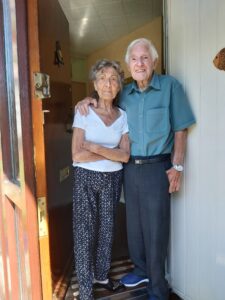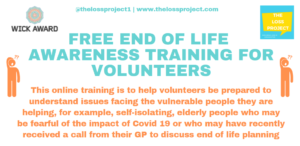How can we have conversations about end of life?
Polly Mann, the worker in Hackney Wick Big Local, noticed that members of the community were facing difficult decisions while in lockdown and needed someone to talk them through with. Here, we find out about the initiative she has launched to ensure that these conversations can happen with care and sensitivity.
The COVID-19 pandemic has been hugely challenging for communities across the country but we’ve also seen what can happen when residents come together and respond to a crisis as a collective.
Since lockdown was announced, our community in Hackney Wick, east London, has had a committed group of volunteers delivering meals and medicine to older and vulnerable residents in the neighbourhood. I know that lots of other Big Local areas have set up similar initiatives, and its great to see so many people looking to help people in their area.
We managed to mobilise our local group quite quickly in order to respond to the pressing needs of the community.
A need to talk
During our deliveries, we have become increasingly aware that the people we visit are often keen to talk to us about how they’re feeling in lockdown. We know that this is a time of huge anxiety for lots of people and its clear that talking about this anxiety is very important at the moment.
We are often the only people the older residents see all week so we often stop and chat with them – we want to make them feel like there are people in the neighbourhood that they can reach out and talk to at a time like this.
The desire for conversations and human contact has grown as we’ve been in lockdown. Initially, getting food to people was our highest priority but as we transition to a ‘new normal’, we are finding that interpersonal connection is becoming the main thing that people are looking for.
One of our volunteers recently had a very moving conversation with a resident who had received a call from their GP about end of life choices and wanted to talk it through with someone.
This conversation made me think that this sort of situation would only be increasing at the moment so I thought it would be really beneficial to hold some informal training sessions on how to have difficult conversations with people.
Many of the volunteers are very young and understandably don’t have any experience of talking to people about topics like end of life care. For me its been really important to identify that conversations like this are not easy to have and most people don’t have any experience of talking about end of life issues. Because of this, I decided to hold a few informal training sessions to give the volunteers some confidence in handling difficult conversations – should they arise.
Designing the training
To plan the training, I got in touch with The Loss Project, Volunteer Centre Hackney and local health professionals working in end of life care. They all have experience in dealing with this exact sort of thing so their contribution has been invaluable so far. We’re not looking to train our volunteers to become grief counsellors as of course this isn’t possible given the time and resources – it’s mostly about giving them a grounding in how these conversations might be approached.
The main areas the training focuses on are:
- Supporting participants to explore their own feelings about end of life
- Exploring end of life issues that might be arising for people
- Preparing volunteers so that they can look after their own wellbeing and respond sensitively to the people they are helping
In some instances, the things that the older residents want to talk about will need to be referred on to professional services so we are also training the volunteers on when and how to do this.
Dying matters
COVID-19 has been a very challenging time for many of us but I’m pleased that its opened up the conversation about death;
death is a part of community life and I want people to become more comfortable in talking about it so that we can collectively support one another during times of grieving.
I hope that these conversations can continue beyond the pandemic and our approach to dying will slowly evolve into something that we can talk about more openly.
So far, our volunteers are providing really valuable support to our elderly and vulnerable neighbours so we’re very keen to keep the initiative going for as long as we can. In some cases, we’re hoping that the relationships we are building now will continue beyond COVID-19 and our community will be stronger as a result.


